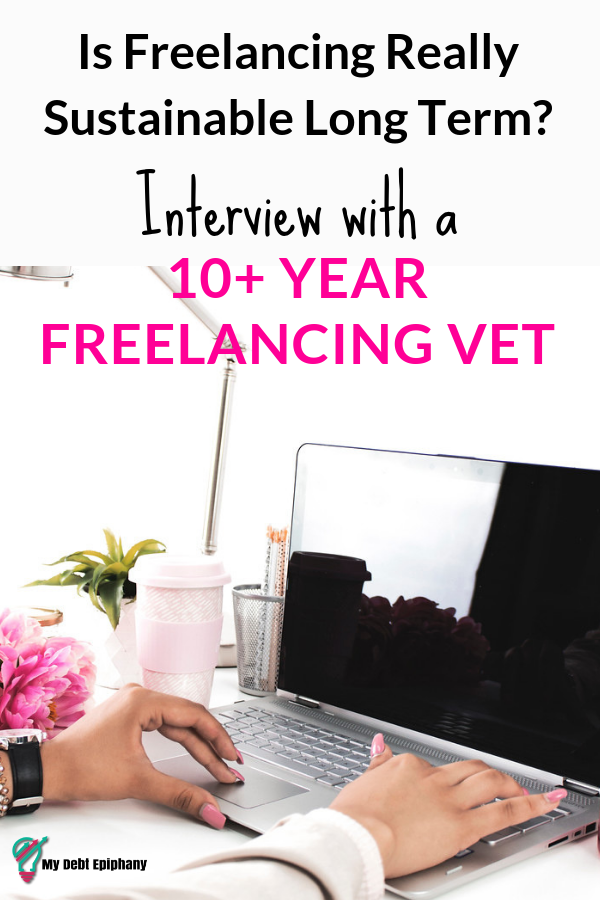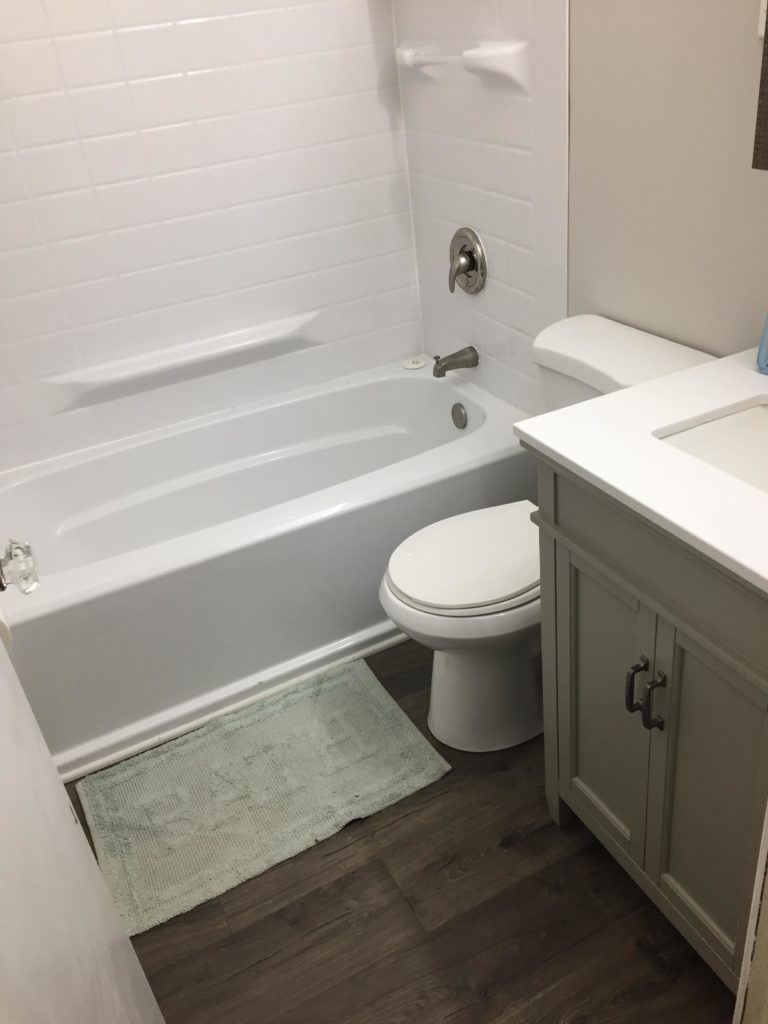Is Freelancing Sustainable? Interview with a Freelance Writer for 15 Years
Is freelancing really sustainable long-term? This is a question I get often about freelance writing. I understand that there are several different ways to work from home and earn extra money but not all of them are sustainable long term.
Freelance writing on the other hand, is something I’ve been doing for 4 years. Writing has allowed me the opportunity to work from home, set my own schedule, pay off debt, and meet so many other goals. Each day is not perfect and there are still ups and downs like any other job, but I feel this is a real work solution that can be beneficial to people who are looking for a flexible career.
I don’t just want you to take my word for it either. My friend Miranda Marquit, who’s been a freelance writer for almost 15 years now, has recently allowed me to ask her some great insider questions. Miranda is a rockstar and in this interview with a freelance writer, you’ll learn more about how she’s made this such a sustainable career long-term.
How long have you been freelancing? Why did you decide to become a freelance writer?
 I started freelancing in 2005, so 2020 will be my 15th anniversary for freelancing. I began freelancing because I wanted a way to earn a living while staying home with my then-toddler as my then-husband was getting his Ph.D.
I started freelancing in 2005, so 2020 will be my 15th anniversary for freelancing. I began freelancing because I wanted a way to earn a living while staying home with my then-toddler as my then-husband was getting his Ph.D.
With an M.A. in Journalism, it just made sense to make a go of it as a freelancer, especially since online content was just taking off and it seemed like it would be easier to get gigs online.
What does a typical day for you look like?
Right now, I usually wake up sometime between 6:30 and 7:30. I don’t use an alarm, so it’s just whenever I wake up naturally. I turn on a 30-minute guided meditation to do while in bed, and that usually keeps me from rolling over and going back to sleep.
My son is 17 now, has his own car, and is fairly independent, so he takes care of getting himself off to school. I am usually awake and see him off, though. I’m usually heating the water for my Crio Bru when he heads to school.
While my Crio steeps (I use a French press), I often do yoga or some sort of stretching.
Once that’s all done, I write. I usually get started writing sometime between 8 and 9 am. I usually write until about noon. It’s important to note that I have batch writing days, for the most part. So, I might have a day where I write three or four articles and other days when I work on outside projects, like my own website or politics stuff, in the morning.
For the most part, I like to use my afternoons to work out, answer email, conduct interviews with sources, work on political stuff, or go to lunch. Sometimes I have community meetings, or I have appointments for my nails, lashes and hair. I pretty much try to be done with the writing and other heavy stuff in the morning whenever possible.
I try to be home when my son gets home from school. We have some chat. He has a job now, so three nights a week, he’s off to work. Otherwise, I make us both dinner (sometimes he helps). In the evenings I work on little projects, catch up with email, work on schoolwork (I’m getting my MBA). Sometimes I just feel like vegging, so I’ll make popcorn and watch a movie or just read for the evening. Occasionally, I go out.
My day is pretty loose and easy right now. When I first started, I worked a lot more and was paid a lot less. My days involved a lot more writing. There were a couple of years that I spent 50-60 hours a week just writing. So being able to get to the point where I have fewer writing clients and higher-paying work has been really nice.
It gives me time to work on things that matter to me outside writing and to take more time for self-care.
Plus, having a teenager has changed the way my day looks as a freelancer. While I try to connect with my son each day, the reality is that he is a teenager. He has a job and friends and schoolwork and the internet. He doesn’t want to hang out with me as much, and he doesn’t need me as much, and that frees up time for me to be more flexible in what I do.
Related: A Week in the Life of a Work From Home Writer
How many clients do you have and do you set an income goal each month?
Right now, I have about 10 clients. I’m debating whittling that number down. I don’t have a real income goal. Instead, I know that, because of where I live, I can write the equivalent of one article a day and be able to have the necessities of life, and cover my other financial goals, like putting money aside for retirement, in a 529 for my son, giving to charity and putting money in a travel fund.
I’ve never had a true income goal. When I first started, my goal was to make enough to cover living expenses that weren’t covered by my then-husband’s student loans. Over time, it was about making sure we had enough to live on, plus cover some of our wants.
Today, it’s about making sure I have what I need to live comfortably with the lifestyle I want while being able to meet my long-term saving/investing goals.
I usually end up with more than I require to meet those objectives, so I don’t get fussed. I know several freelancers who make more than me each month, but I’m not particularly fussed because I have a schedule I like and can enjoy my lifestyle, so trying to make more money seems unnecessary right now.
Related: 22+ Websites That Pay Writers for Guest Posts

How do you manage having a fluctuating income? Have you ever felt nervous about a super lean month?
Today I don’t usually get nervous. I have savings, I have a diverse enough income, and it’s been a while since I’ve felt nervous. That said, there were times in the past when I was nervous about lean months.
When I was first starting out, I worried about relying on student loans and credit cards to make ends meet. When I started making more, I worried when I lost a big client. Once, I lost a client that accounted for almost half my income when they were bought by a rival and shut down. That was scary because I didn’t know how to replace that income. It took me three months to find clients to replace that gig.
In the past, I had a system where I figured out what we needed to live on. When I had a month that resulted in income beyond what we needed, I would set it aside in savings. I worked to build a buffer so that if a lean month did come, I could draw on the buffer.
Another thing I did was keep up my accounts at a couple of different content farms. It wasn’t good-paying work, but if I was falling short one month, I could easily write some low-paying articles to at least help close the gap. Having a couple of low-paying, but easy-to-work-for and flexible clients helped a lot in terms of giving me the option to produce extra content if needed.
Related: How to Come Up With a Bare Bones Budget
Saving and Paying Off Debt With an Irregular Income
What obstacles did you face when starting your freelance business and how did you overcome them?
One of the biggest obstacles when I started was time. I had a toddler. Finding a solid block of time to work was difficult. In the end, I put my son in daycare twice a week to give me time. That actually turned out to be a good move because I was able to write with more regularity and more than cover the cost. Additionally, it helped that I lived in an area with a low cost of living, where daycare wasn’t very expensive.
Another challenge was just getting gigs. Eventually, I set up a schedule where I would write what I was getting paid for, and then, later, while my son was down for a nap or after he went to bed, or if he was playing with his dad, I’d spend time applying to jobs using job boards.
I just applied for everything. At one point, I was writing descriptions of bamboo flooring and writing about different window treatments. I had hoped that I’d be paid to write investigative pieces or about politics or something. I ended up taking anything, writing for peanuts and just scraping by.
Eventually, I found that the financial niche offered better pay and more regular writing, and I began shifting my efforts to concentrate on that niche and make money there.
What’s something you stand by in your business that you wish you would have known day one?
That sometimes it’s worth it to buy more time. It took me forever to put my son in daycare twice a week. I wish I’d done it sooner, or at least hired a babysitter or mother’s helper to take care of him. It would have allowed me to ramp up sooner.
Today, I pay someone to clean my house and take care of my yard. I even use Instacart. I slowly started outsourcing some of this stuff as I could afford to, and I’ve been able to use my time much more effectively as a result.
From getting someone to manage social media, to hiring a podcast editor, it’s been a huge game-changer for me to pay others to do things I’m not good at or don’t like doing. I use my time to do things that offer a bigger ROI. For me, that’s writing.
You’ve been at this for a while. In your opinion, where is the best place to find new clients?
Networking is still my favorite way to find higher-paying clients. Build a network and your reputation, and it’s much easier to get clients. I haven’t applied for a job in ages. There are good places to look, though, while you’re looking for clients.
Problogger (free) and the Freelance Writers Den (costs money) can be good places to find basic work that can get you started. You can also look at places like Media Bistro for writing jobs. But if you want the best paying jobs, building a network with other freelancers (I sometimes get referrals from other freelancers, or I give referrals if I can’t take a client) and networking at conferences can help you get the gigs that aren’t always posted on the boards.
Related: How to Get Started With Freelance Writing
How (if at all) has the industry changed over the years? How have you adapted?
When I started, it was common to get paid $5 to $10 for articles of 250 to 350 words and keyword stuffing was all the rage. Additionally, there were a number of content farms that would pay you $5 to $25, plus residual income based on pageviews, for fairly basic articles that you could just post.
This made it fairly easy to just work as much as you wanted. Over time, I’ve had to adapt to new SEO standards, lengths and sourcing requirements. Some of the sourcing has been fairly easy to adapt to because, with my journalism background, I already know how to vet sources.
But I’ve adapted by raising my rates and being clear about what I will and will not do. I recently had a client try to get me to actually create a data model, rather than just report on data, and I had to put my foot down and say no.
One thing you have to watch out for is that some clients expect you to do a lot more, and you might need to figure out what makes sense for you. For example, I had to let clients know that I would try to share what I wrote for them on some type of social media once, but they would need to let me know when the piece was published if they want that for free because I can’t keep up with everything.
What’s your advice for a newbie on how they can get started and find clients?
I suggest having your own blog to showcase your work. Then, spend time each day applying for gigs on places like Media Bistro and Problogger.
You can also network with other freelancers to see if they can throw work you don’t need your way. In a lot of ways, it’s really about persistence and keeping at it. Finally, turn in good work and turn it in on time, and you’ll be more likely to get gigs.
Related: How to Start a Blog in Minutes

Learn How to Start a Money-Making Blog in 10 Days

My free blogging course will teach you everything you need to know about starting a blog, increasing your traffic, and how to monetize it quickly so you can earn money doing something you love.






